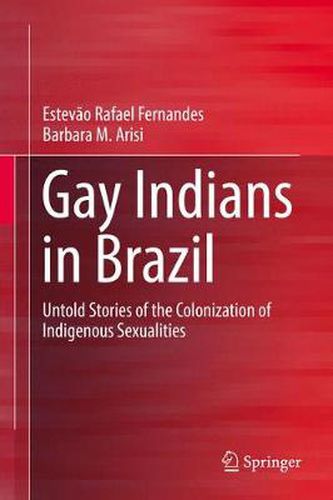Readings Newsletter
Become a Readings Member to make your shopping experience even easier.
Sign in or sign up for free!
You’re not far away from qualifying for FREE standard shipping within Australia
You’ve qualified for FREE standard shipping within Australia
The cart is loading…






This title is printed to order. This book may have been self-published. If so, we cannot guarantee the quality of the content. In the main most books will have gone through the editing process however some may not. We therefore suggest that you be aware of this before ordering this book. If in doubt check either the author or publisher’s details as we are unable to accept any returns unless they are faulty. Please contact us if you have any questions.
This book unveils an ignored aspect of the Brazilian history: how the colonization of the country shaped the sexuality of its indigenous population. Based on textual research, the authors show how the government and religious institutions gradually imposed the family model considered as normal to Brazilian indigenous gays through forced labor, punishment, marriages with non-indigenous and other methods.
However, such disciplinary practices didn’t prevent the resistance of the natives whose sexuality operates out of the hegemonic model, and the book also analyzes the impact of these forms of dissent on the development of indigenous movements, interethnic relations and indigenous policies in Brazil.
Building upon Post-Colonial and Queer theories, the authors present a historical overview of the ideas and practices employed by the religious and governmental authorities to repress homosexuality among indigenous peoples since the beginning of the colonization process, on the 16th century. They also show how this process of colonization of indigenous sexualities goes beyond the formal colonization period, which ended with the Brazilian Independence in 1822, and is part of a wider process of compulsory heterosexualization and heteronormativity of native peoples, based on scientific, theological, social and cultural assumptions that inspired religious, civilizing, academic and political practices throughout Brazilian history.
$9.00 standard shipping within Australia
FREE standard shipping within Australia for orders over $100.00
Express & International shipping calculated at checkout
This title is printed to order. This book may have been self-published. If so, we cannot guarantee the quality of the content. In the main most books will have gone through the editing process however some may not. We therefore suggest that you be aware of this before ordering this book. If in doubt check either the author or publisher’s details as we are unable to accept any returns unless they are faulty. Please contact us if you have any questions.
This book unveils an ignored aspect of the Brazilian history: how the colonization of the country shaped the sexuality of its indigenous population. Based on textual research, the authors show how the government and religious institutions gradually imposed the family model considered as normal to Brazilian indigenous gays through forced labor, punishment, marriages with non-indigenous and other methods.
However, such disciplinary practices didn’t prevent the resistance of the natives whose sexuality operates out of the hegemonic model, and the book also analyzes the impact of these forms of dissent on the development of indigenous movements, interethnic relations and indigenous policies in Brazil.
Building upon Post-Colonial and Queer theories, the authors present a historical overview of the ideas and practices employed by the religious and governmental authorities to repress homosexuality among indigenous peoples since the beginning of the colonization process, on the 16th century. They also show how this process of colonization of indigenous sexualities goes beyond the formal colonization period, which ended with the Brazilian Independence in 1822, and is part of a wider process of compulsory heterosexualization and heteronormativity of native peoples, based on scientific, theological, social and cultural assumptions that inspired religious, civilizing, academic and political practices throughout Brazilian history.